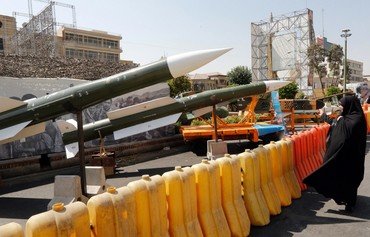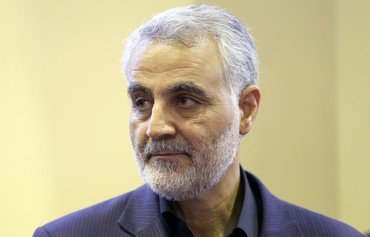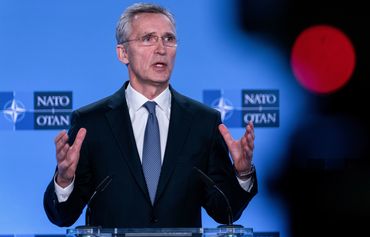US Secretary of State Mike Pompeo on Friday (January 3rd) said the US was "committed to de-escalation" after the killing of Islamic Revolutionary Guard Corps Quds Force (IRGC-QF) commander Qassem Soleimani in a US airstrike.
Pompeo said he had spoken with British Foreign Secretary Dominic Raab, German Foreign Minister Heiko Maas and Chinese Politburo member Yang Jiechi.
"Thankful that our allies recognise the continuing aggressive threats posed by the IRGC-QF," he wrote. "The US remains committed to de-escalation."
The US earlier announced it had killed Soleimani in a strike on Baghdad's international airport, along with the deputy chief of Iraq's paramilitary Popular Mobilisation Forces (PMF), who had close ties with Iran.
International reaction
Britain on Friday called for calm, with Raab saying London had "always recognised the aggressive threat" posed by Soleimani and the IRGC-QF.
"Following his death, we urge all parties to de-escalate. Further conflict is none of our interests," he said.
France's Europe minister Amelie de Montchalin on Friday called for efforts to de-escalate the deepening conflict in the Middle East.
French President Emmanuel Macron would consult soon with "players in the region", she told French radio.
"All of France's efforts... in all parts of the world aim to ensure that we are creating the conditions for peace or at least stability," she added.
"Our role is not to take sides, but to talk with everyone," Montchalin said.
The NATO military alliance said it was monitoring the situation in Iraq closely Friday with an eye to the safety of its training mission there.
NATO maintains a limited presence in Iraq to train government security forces and the alliance was not involved in the attack on Soleimani.
"We remain in close and regular contact with the US authorities," spokesman Dylan White said.
Soleimani's killing is an "irreparable blow" for the Iranian regime, Maryam Rajavi, the leader of a Paris-based exiled opposition group said Friday.
Rajavi, head of the National Council of Resistance of Iran (NCRI), called for the Iranian influence to be expelled from the region, "in particular Iraq, Syria and Lebanon".
She accused Soleimani of being "one of the biggest criminals in Iran's history" and "personally implicated in the massacre of thousands of people in the region".
Moscow warned Friday that the killing of Soleimani would boost tensions across the Middle East, with the foreign ministry describing the move as "an adventurist step".
Russia and Iran are key allies in the Middle East, with the militaries of both countries backing President Bashar al-Assad's regime in Syria.
Iran and its proxies react
Iran's supreme leader Ali Khamenei vowed "severe revenge" for Soleimani's death, while Foreign Minister Mohammad Javad Zarif slammed the US strike as "extremely dangerous and a foolish escalation".
Khamenei declared three days of mourning for Soleimani.
Yemen's Iran-backed Houthis (Ansarallah) on Friday condemned the killing, with senior political official Mohammed Ali al-Houthi calling for "swift reprisals".
In Lebanon, the leader of Iran-backed Hizbullah, Hassan Nasrallah, warned of "punishment for these criminal assassins".
Syrian state news meanwhile quoted a Syrian foreign ministry official describing the killings as "a serious escalation" of the regional situation.
But in the few areas of Syria that still escape the regime's control, some celebrated the death of a man they hold responsible for thousands of civilian deaths.
During a Friday protest in Idlib, one demonstrator held a placard that read: "We rejoice in the death of the terrorist Qassem Soleimani. Thank you Trump."
Others handed out sweets to celebrate Soleimani's death.
Leaders of Syrian opposition groups for their part hailed the death of a man they blame for thousands of deaths in the Syrian civil war.
Mixed reaction in Iraq
In Iraq, Iran-backed Iraqi militia Asaib Ahl al-Haq urged its fighters to be on high alert, while militiaman-turned-cleric Moqtada al-Sadr reactivated his Mahdi Army, nearly a decade after dissolving the notoriously anti-US force.
But there were daring celebrations in Baghdad's Tahrir Square, the epicentre of a three-month-old protest movement that has slammed the Iraqi government as corrupt and beholden to Tehran.
"Oh Qassem Soleimani, this is a divine victory," demonstrators chanted as some danced in the streets.
Phillip Smyth, a US-based specialist in Shia armed groups, described the strike as "the most major decapitation strike that the US has ever pulled off".
He told AFP it would have "bigger" ramifications than the 2011 US operation that killed al-Qaeda chief Osama bin Laden and the 2019 US raid that killed "Islamic State of Iraq and Syria" (ISIS) leader Abu Bakr al-Baghdadi.
"There is no comparison," Smyth added.

![A worker at the Iranian embassy in the Lebanese capital Beirut adjusts a poster of IRGC Quds Force commander Qassem Soleimani, who was killed in a US strike on his convoy in Baghdad on January 3rd. [Anwar Amro/AFP]](/cnmi_di/images/2020/01/03/21766-Qassem-Soleimani-poster-600_384.jpg)






